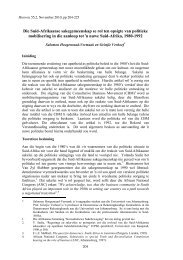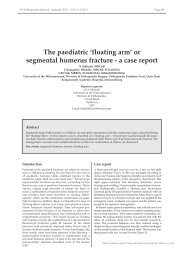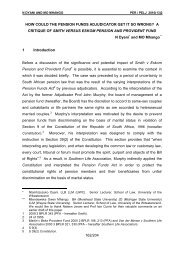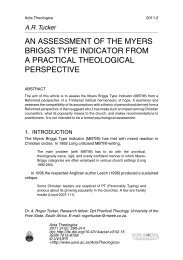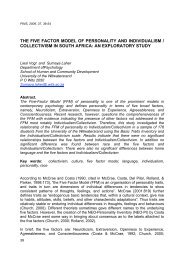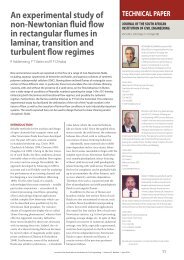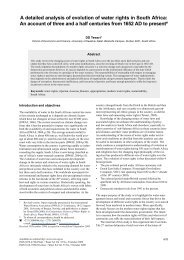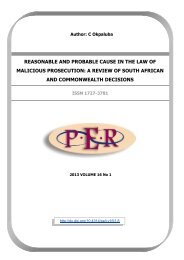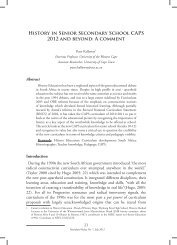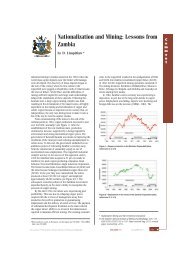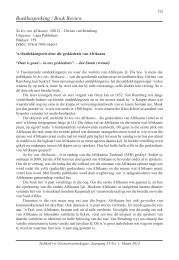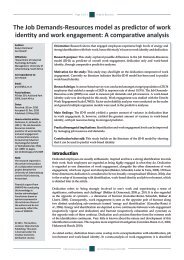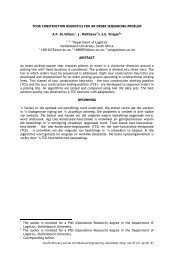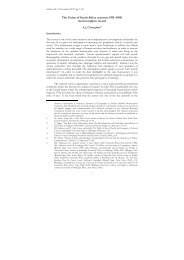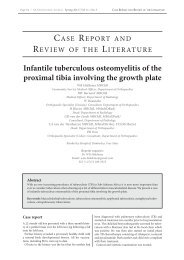Frances Baard's and Helen Joseph's struggle against apartheid ...
Frances Baard's and Helen Joseph's struggle against apartheid ...
Frances Baard's and Helen Joseph's struggle against apartheid ...
Create successful ePaper yourself
Turn your PDF publications into a flip-book with our unique Google optimized e-Paper software.
Musiiwa - <strong>Frances</strong> Baard’s <strong>and</strong> <strong>Helen</strong> Joseph’s <strong>struggle</strong><br />
banned. I still say that I want freedom in my lifetime. I don’t care if the African National<br />
Congress is banned or what-what, my spirit is not banned.” 74 In contrast, <strong>Helen</strong> Joseph does<br />
not express her experiences in terms of a longing desire.<br />
Gender, race <strong>and</strong> class<br />
Baard <strong>and</strong> Joseph are not blind to gender issues because they make reference to both<br />
women <strong>and</strong> men. Baard’s epilogue is strongly in favour of the cooperative action of<br />
women <strong>and</strong> men. She emphasises:<br />
We women have pledged from the outset that we are going to work side-by-side with our<br />
men, until freedom is obtained. I wish our women could st<strong>and</strong> together now as they have<br />
been st<strong>and</strong>ing together for a long time with their men. They must be militant like the men.<br />
We know that there is no freedom, which can be for the men without the women … They<br />
mustn’t leave everything to the men. 75<br />
For Joseph, the gendered approach to the <strong>struggle</strong> becomes the title of her<br />
autobiography, Side by Side.<br />
While there are numerous instances of women <strong>and</strong> men fighting together <strong>against</strong><br />
<strong>apartheid</strong>, such as the national Defiance Campaign of 1950; the anti-pass campaigns of<br />
1956; <strong>and</strong> the potato boycott of 1959, there were instances where race mediated gender.<br />
For instance, even though Joseph was fighting <strong>against</strong> the colour bar, she still finds<br />
race/colour pervading the anti- <strong>apartheid</strong> sect of the white liberals. She explains:<br />
There had, in fact, been considerable division of opinion on whether the Congress of<br />
Democrats should have a multiracial membership or not, but the ANC had been adamant<br />
on this point. The Congress of Democrats must be white. As whites we could be equal<br />
partners in the Congress but we would not be welcome to compete with the other<br />
congresses for membership. Several people at the conference pressed for multiracial<br />
membership, but the ANC viewpoint finally prevailed. The South African Congress of<br />
Democrats, the COD, as it became known, was formed with a white membership, to be<br />
the white wing of the Congress Alliance. 76<br />
Joseph does not explain why the ANC would not allow Africans to be part of the South<br />
African Congress of Democrats, but if she was not part of the ANC she took<br />
consolation from the fact that she was a member of an organisation that “identified itself<br />
with the <strong>struggle</strong> for freedom <strong>and</strong> justice, … even if it was not itself multiracial in<br />
composition”. 77<br />
The fluidity <strong>and</strong> complexity of categories such as “gender, race <strong>and</strong> class”, is best<br />
captured by Baard. She notes that:<br />
There were such a lot of things happening at that time, <strong>and</strong> some very good things too. In<br />
1955 a very great thing happened. We organized the Congress of the People at Kliptown.<br />
Ooh! What a wonderful thing was there! All over the country people organized to come to<br />
that congress, <strong>and</strong> all the groups worked together to organize it <strong>and</strong> make it truly national,<br />
so that everyone was represented there. Everyone was invited to come. Even SACTU sent<br />
delegates too, though they weren’t a member of the Congress Alliance yet. SACTU only<br />
74. Baard <strong>and</strong> Schreiner, My Spirit is Not Banned, Part 3, “Jail”.<br />
75. Baard <strong>and</strong> Schreiner, My Spirit is Not Banned, Part 4.<br />
76. Joseph, Side by Side, Part 1, Chapter 4, “Becoming an Activist”.<br />
77. Joseph, Side by Side, Part 1, Chapter 4, “Becoming an Activist”.<br />
79



